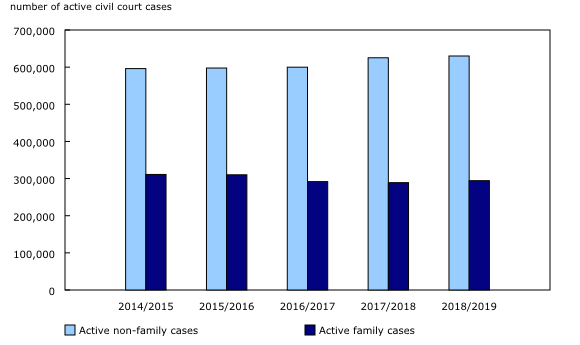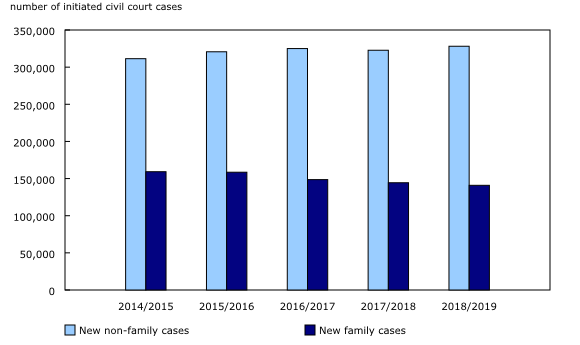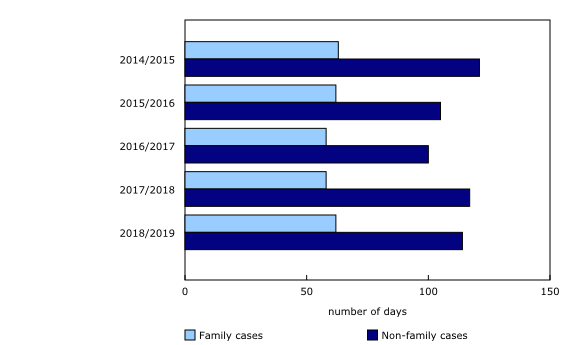Civil Court Survey, 2018/2019
Archived Content
Information identified as archived is provided for reference, research or recordkeeping purposes. It is not subject to the Government of Canada Web Standards and has not been altered or updated since it was archived. Please "contact us" to request a format other than those available.
Released: 2020-06-17
The total number of cases handled by the civil courts in Canada rose 1.1% in 2018/2019—from 914,194 cases to 924,316 cases—mainly because of heavier caseloads in Ontario, British Columbia, Saskatchewan, the Northwest Territories and Nunavut.
The data released today are from the Civil Court Survey and relate to cases that proceeded through the Canadian civil court justice system in 2018/2019. Distinct from criminal cases, civil cases are typically private disputes between people or organizations.
The civil court caseload is divided into two categories: family cases—which generally deal with divorce and separation, parenting arrangements, support, child protection and various other non-criminal family matters—and non-family cases, such as contract disputes, lawsuits for damages, employment actions, probate proceedings and other claims involving money.
Canada's civil court caseload increases for a second consecutive year
Non-family cases accounted for just over two-thirds of Canada's civil court caseload in 2018/2019, while family cases accounted for almost one-third (31.8%).
Compared with a year earlier, there were 10,122 more active cases in Canada's civil courts in 2018/2019. Nunavut (+8.4%) and Ontario (+3.0%) had the largest year-over-year increases in family cases, and the Northwest Territories (+10.1%), Saskatchewan (+4.0%) and British Columbia (+4.0%) had the largest year-over-year increases in non-family cases.
Almost half (49.3%) of the total caseload in 2018/2019 included ongoing cases from previous years, while 50.7% were new cases.
Civil courts handle fewer new family cases and more new non-family cases
The number of family disputes taken to court decreased for a fifth consecutive year in 2018/2019 (3,470 fewer case initiations). This decrease was driven by yearly reductions in the number of new child protection, guardianship, support and custody cases initiated since 2014/2015.
In contrast, there were 328,124 new non-family cases initiated in 2018/2019, the highest number in five years. Overall, 8 out of the 10 reporting provinces and territories registered increases in new non-family cases. Increases ranged from 2.7% in New Brunswick to 20.7% in the Northwest Territories.
Family cases more likely to receive multiple decisions than non-family cases
Depending on the number of issues requiring resolution, it is not uncommon for parties in a family case to receive multiple decisions from the court ("disposition events") that either dispose of part, or all, of a case. Disposition events include, for example, judgments, settlements and dismissals.
On average, almost two-thirds (63.7%) of family cases reported receiving multiple decisions in 2018/2019, whereas just over one-third (35.2%) of non-family cases received more than one decision.
Family cases reach first disposition more quickly than non-family cases
The median number of days it takes for a case to reach a first disposition event varies by case type. In 2018/2019, family cases relating to child and family protection reached first disposition within nine days of initiation, while divorce and separation cases reached first disposition in three and six months, respectively. For non-family cases, civil protection cases reached first disposition within 10 days of initiation, and probate, collection and landlord/tenant matters reached first disposition in up to one month. However, non-family cases seeking damages, such as motor vehicle accident claims or negligence cases, took over one year (16 months) to reach first disposition.
Overall, the median length of time for family cases to reach first disposition in 2018/2019 was 62 days, slightly longer (+4 days) than in 2017/2018. Although family cases proceeded more quickly than non-family cases, the median number of days needed to reach first disposition in non-family cases decreased from 117 to 114 days in 2018/2019, largely because of faster processing times for contract-related disputes.
Note to readers
The Civil Court Survey (CCS) excludes data from Newfoundland and Labrador, Quebec, and Manitoba, jurisdictions that are not yet reporting information for the survey.
For the purposes of the CCS, civil court cases are considered to be "active" in any year that activity is reported. Family cases may return to court at any time to amend the terms of a court order or agreement.
There are factors that may influence case length that are outside the scope of the CCS. The CCS does not have information on the reason for any scheduling changes, adjournments or delays in court activity. Some jurisdictions are able to report information on referrals to services outside of court, such as alternative dispute resolution programs, mediation or other family justice services, which help parties come to an agreement outside of court or help parties through the court process (e.g., parent information and education programs). However, it is not possible to determine whether the programs were completed or successful.
The COVID-19 pandemic is likely to have a considerable impact on the civil courts. Readers should note that these data are from before the COVID-19 pandemic, and future analysis may be able to assess the impact of the pandemic on civil courts in Canada.
Contact information
For more information, or to enquire about the concepts, methods or data quality of this release, contact us (toll-free 1-800-263-1136; 514-283-8300; STATCAN.infostats-infostats.STATCAN@canada.ca) or Media Relations (613-951-4636; STATCAN.mediahotline-ligneinfomedias.STATCAN@canada.ca).
- Date modified:




